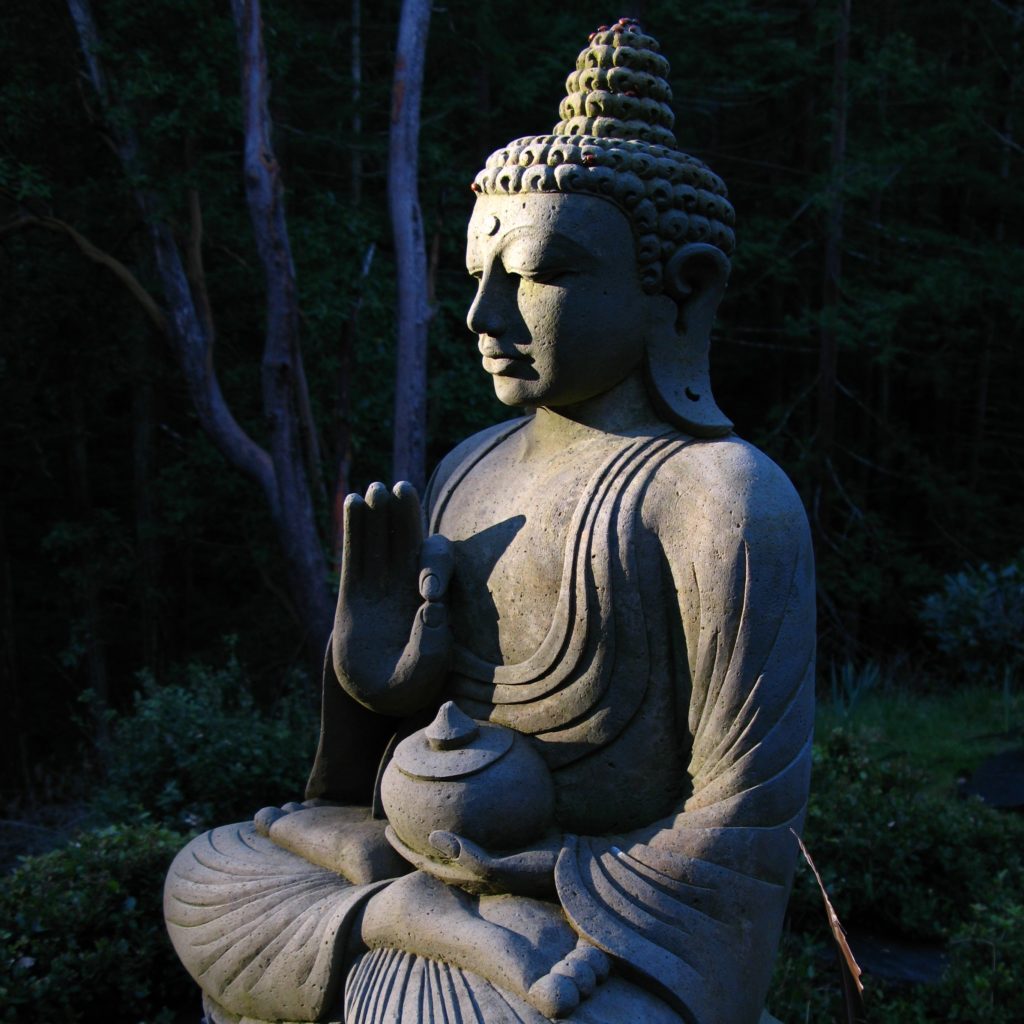Finding Greater Ease: Introduction to Meditation
Elaine Jackson
February 6 - 9, 2020
Level
Beginner and Above
Silence Level
Partial Silence
Who is it for?
This retreat is intended for beginners wishing to receive practical guidance on how to bring greater ease and joy into their lives with the help of a Buddhist meditation practice. It will also provide an overview and a taste of the various types of meditation practice that exist within the Tibetan Buddhist tradition. Those who are not complete beginners to meditation, but wish to revitalize and go deeper with their practice, will also benefit from this course.
What is it?
Every single one of us wants happiness. Unfortunately though, the faulty assumptions by which we live our lives do not afford us the pleasure of abiding in the state of happiness, peace, and contentment that we long for. The good news is that Buddhist meditation can bring you to such a state of ease. When we successfully train our minds through various meditation techniques, happiness follows, as surely as the day follows the night!
…
It is mind alone that determines whether we experience happiness or suffering from events in our life. Meditation directly addresses the mind. Through meditation, we can see how disturbing emotions and mental problems arise in our minds and can apply techniques to counteract them. Meditation is the key to creating inner peace, greater emotional balance and a happier, healthier life.
…
In this stimulating weekend course, we’ll have an opportunity to taste various meditation techniques. We will also enjoy discussions together on ways in which we can support our meditation practice.
This course will be led by Vajrapani Institute’s Resident Teacher, Elaine Jackson. See below for a personal note from Elaine.
A Note from the Course Leader
🧘“You will be well held as you immerse yourself in quietude, experiencing a peace that is truly available.”🧘
Hello Dear Friends,
In my more than 40 years of meditation experience, as I watch the “busyness” and pace of everyday life escalate and see the growing epidemic of anxiety and depression, especially among young people, I want more than ever to share the sanity of Buddhist practice with you. Our founder, Lama Yeshe, called Buddhism “psychology of the mind” and encouraged us to become our own therapist.
I’m looking forward to our next Introduction to Meditation retreat and I thought it might be helpful to share a little bit about it, and about why it is useful to develop a meditation practice.
Generally, when we think of meditation, we think of developing concentration through “JOK GOM” – placement meditation – placing our mind on an object, holding it there and bringing it back when it is kidnapped by a thought, a feeling or an emotion. Our object might be our breath, our mind, an image, or any number of possibilities.
The word “GOM” in Tibetan, which we translate as meditation, has the connotation of “becoming familiar with virtue.” Besides JOK GOM, also widely used are both SHAR GOM, which is review meditation and CHE GOM, which is analytical meditation. In fact, we are actually engaging in a form of meditation as we contemplate our daily activity, or when we review and analyze any situation.
For meditation as a spiritual practice, the important addition to the definition is the word “virtue.” In Tibetan, virtue is defined as “that which brings happiness now and in the future.”
When we reflect on our own personal mental habits, it is useful to check: Is my everyday “meditation” leading to happiness? Perhaps we focus on our shortcomings, on what we wish we would have done, could have done or should have done differently. This “would-a, could-a, should-a done syndrome” is a close sister to the “if only syndrome.” These “meditations” keep us trapped.
When we become adept at placement meditation, we recognize that inner peace is available in each present moment. We practice letting go and letting be. We see mental activities as ephemeral, as illusory, as having no essence. This doesn’t mean that we lose our ability to think. We experience that is that it is possible to abide in a state of peace and to think more clearly. This is our birthright. Peace is available right now. Through meditation we learn to touch it, to taste it, and to return to it again and again until it becomes the habit of our mind.
In this retreat we will be gentle with ourselves and embrace ease. Our sessions will include sitting practice interspersed with walking meditation. We will have guided as well as silent practice and we will practice using different meditation objects. We will examine the obstacles that arise and discuss their antidotes. We will also take a look at the Tibetan Buddhist Saint, Lama Tsong Khapa’s basic overview of Tibetan Buddhism – the Three Principal Aspects of the Path. This will give us a body of knowledge upon which to engage in review and analytical meditations.
I invite you to give yourself this gift of inner peace. Leave your phones and internet devices behind. Unplug from your ordinary “busyness,” sit in the Gompa or by the Stupa, walk in the forest along the “Peace Trail,” listen to the meandering creek, hear the welcome of the birds, marvel at the beauty. You will be well held as you immerse yourself in quietude, experiencing a peace that is truly available.
I look forward to seeing you there. Meanwhile may you be well and happy.
Biggest love,
Elaine
Suggested Reading
- How to Meditate, by Kathleen McDonald.
- The Attention Revolution, by Alan Wallace.
Additional Information
- Please plan on arriving between 3:00 and 5:00 PM on the first day of the retreat
- Please plan on departing approximately 2:00 PM on the last day of the retreat
- Consider reviewing our accommodations
- For more detailed information, please see our FAQ
If you are interested in serving as Course Liaison for this retreat, please apply here.
This is a Pay It Forward Retreat!
There are no fees for this retreat.
That’s right. No fees. The retreat is offered to anyone who participates. It’s an experiment we started at 2012’s Kopan West- Lam Rim retreat in the spirit of making the Dharma (Buddha’s teachings) freely available to all.
If it is being offered, who pays for my retreat?
Your retreat has been sponsored by someone who came before you and by past benefactors. Because it’s a gift, you can’t pay them back – but you can pay-it-forward by making a contribution that will allow future retreatants to experience the same generosity.
How does this donation system work?
At the end of the retreat, you will have the opportunity to make a donation based on what feels right in your heart. 100% of the proceeds will go towards supporting future retreatants to keep the generosity going. No pressure or questions asked. Let your heart decide what you would like to offer.
Is there a deposit?
Yes. A $175 deposit is required to reserve a space. Your deposit will be refunded as long as you attend the retreat in full. No refunds for cancellations or no shows.
How do I choose my accommodations?
Once you start the registration process, you’ll see details of the accommodations that are available from camping, dorms, or private rooms. All accommodations are made available on a first-come-first-serve basis.
Is partial attendance allowed?
In order to provide the most conducive conditions for retreat, we hold full time, residential retreats only. This allows the group energy to build and minimizes distractions, so you can gain the full benefit of retreat. See our FAQ for more information. Some exceptions can be made for special circumstances and will need the approval of the teacher and our Community Relations Coordinator (CRC) before the retreat begins. Please contact us at office@vajrapani.org.
Teacher’s fees
Traditionally, spiritual teachings are considered priceless; remuneration of our teachers is not included in the fee information detailed on this page. Instead, we invite you to consider bringing a cash donation with you to express your gratitude for the teachings. Participants get a chance to present a cash offering to the teachers on the last day of the retreat and this is supplemented by a donation from Vajrapani Institute. Please note that we don’t offer a credit card option for teacher’s fees.
About the Teacher

Elaine Jackson
Elaine Jackson is a founding member of Vajrapani Institute and has been a student of Tibetan Buddhism since 1977. She has studied with many of the greatest Buddhist teachers of our time including His Holiness the Dalai Lama, Lama Thubten Yeshe, Kyabje Zong Rinpoche, Lama Thubten Zopa Rinpoche and many others too numerous to list. […]
Learn more about Elaine JacksonCategory : Meditation Retreats

